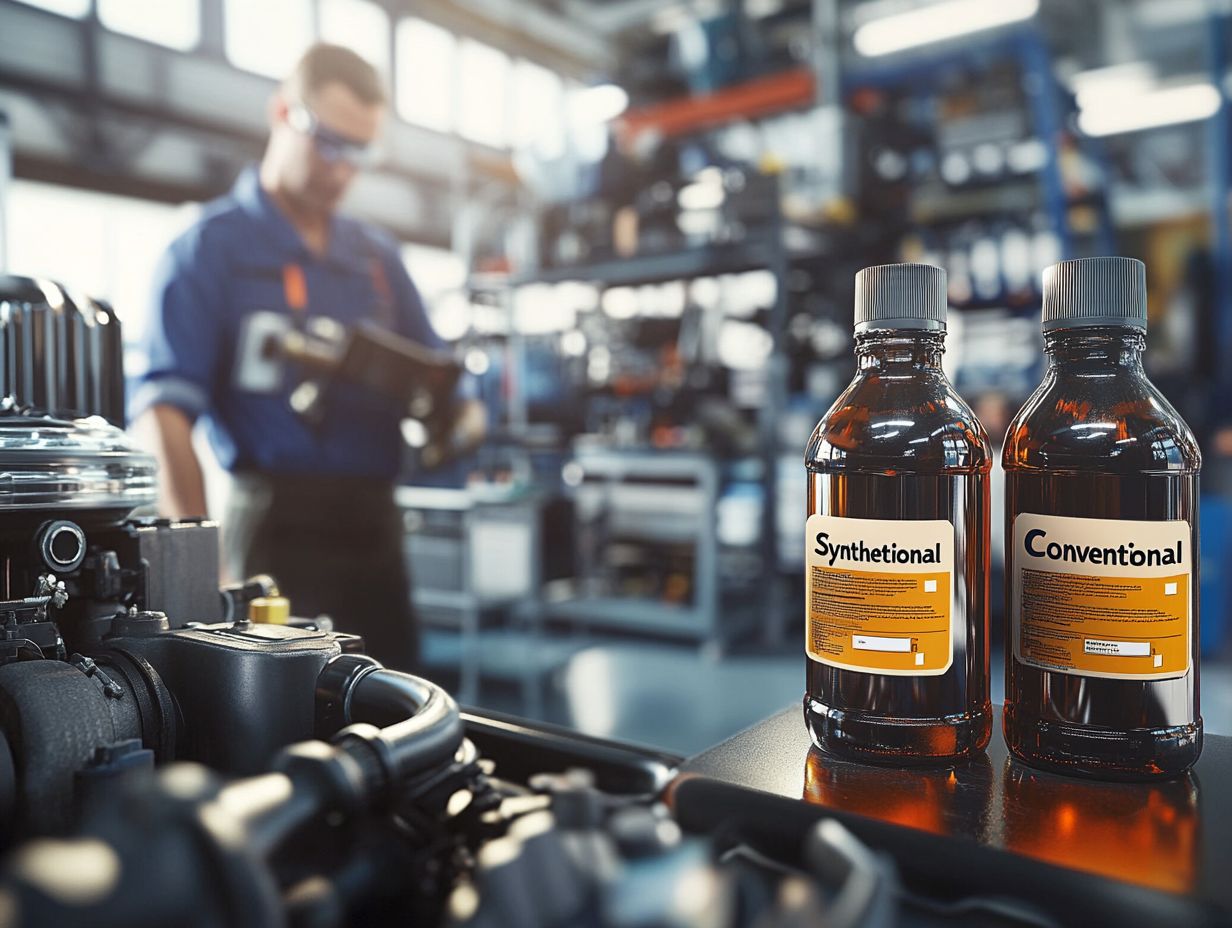How to Choose the Right Engine Oil
Choosing the right engine oil is essential for maintaining your vehicle’s performance and extending its lifespan. Opting for the wrong oil can lead to diminished efficiency and potential engine damage.
This article unpacks the complexities of engine oil, guiding you through understanding labels and specifications and exploring the various types available.
It provides key considerations tailored to your vehicle type and driving conditions, along with a step-by-step approach to selecting the oil that best suits your needs.
Moreover, you’ll uncover the crucial importance of regular oil changes to ensure your engine runs smoothly.
Jump in and discover how to give your engine the care it truly deserves!
Contents
- Key Takeaways:
- The Importance of Choosing the Right Engine Oil
- Understanding Engine Oil Labels and Specifications
- Types of Engine Oil
- Factors to Consider When Choosing Engine Oil
- How to Choose the Right Engine Oil for Your Vehicle
- Maintaining Your Engine with the Right Oil
- Frequently Asked Questions
- What factors should I consider when choosing the right engine oil?
- Can I use any type of engine oil for my vehicle?
- What does oil viscosity mean and why is it important?
- How do I know which oil viscosity is right for my vehicle?
- What happens if I use the wrong type of engine oil?
- Is it okay to mix different types of engine oils?
Key Takeaways:

- Using the wrong engine oil can have negative effects on your vehicle’s performance and longevity.
- Understanding oil thickness ratings and engine protection standards is crucial in choosing the right engine oil.
- Consider factors like your vehicle type, driving conditions, and manufacturer recommendations when selecting the best engine oil for your car.
The Importance of Choosing the Right Engine Oil
Selecting the right engine oil is vital for preserving optimal engine performance and prolonging your vehicle’s lifespan. The appropriate motor oil whether synthetic, high-mileage, or conventional plays a critical role in ensuring your engine runs smoothly across various driving conditions.
Carefully evaluate factors such as oil thickness ratings, engine protection standards, and the specific requirements of your automobile to choose the most suitable oil that aligns with your engine s health and performance characteristics.
Effects of Using the Wrong Oil
Using the wrong engine oil can seriously compromise your engine s performance, resulting in increased wear and tear and a noticeable dip in fuel efficiency.
This minor oversight can cause overheating, warping, or breaking critical engine parts situations that are both perilous and expensive to rectify. You may also encounter sludging, where contaminants gather and clog vital oil passages, depriving essential components of much-needed lubrication.
The significance of regular oil changes cannot be overstated; fresh oil is key to maintaining optimal engine function and extending its lifespan. Integrating oil additives can enhance viscosity and offer extra protection against wear, ensuring your vehicle runs smoothly and efficiently.
Understanding Engine Oil Labels and Specifications
Grasping the intricacies of engine oil labels and specifications is paramount when it comes to choosing the ideal motor oil for your vehicle. These labels hold crucial information about oil thickness ratings, engine protection standards, and various oil types, all of which play a significant role in enhancing your engine’s performance.
Decoding Viscosity Ratings and API Symbols
Viscosity ratings and API symbols are essential elements of engine oil labels, offering valuable insights into the oil’s performance characteristics and its suitability for various temperatures.
Understanding these ratings is crucial for ensuring optimal engine function, as they significantly impact how well the oil flows under extreme conditions. Engine oils use a multi-grade system to indicate how they perform in different temperatures, which is crucial for engines operating in varied climates.
In colder conditions, lower viscosity allows the oil to circulate swiftly, minimizing wear during startup. Conversely, in high-temperature environments, higher viscosity ensures the oil retains its protective properties, preventing breakdown.
The API symbols further clarify the oil’s quality, indicating whether it meets specific standards for engine protection and efficiency, ultimately empowering you to make informed choices for your vehicle.
Types of Engine Oil

Engine oil is available in a variety of types, including conventional oil, synthetic oil, high-mileage oil, and blended oils.
Each type provides distinct advantages designed to meet the specific needs of your vehicle and the conditions in which you drive.
Conventional, Synthetic, and Blended Oils
Understanding the unique characteristics of conventional, synthetic, and blended oils can significantly impact your engine’s performance and longevity.
It is essential for anyone seeking to enhance their engine’s efficiency and durability. Conventional oil, extracted from crude oil, provides adequate protection but tends to break down more quickly under extreme conditions. On the other hand, synthetic oil is meticulously engineered to surpass conventional options, offering superior lubrication and impressive resistance to temperature fluctuations.
Blended oils are designed to combine the best of both worlds, achieving a balance that caters to diverse driving conditions. While each oil type presents its own set of advantages, they also come with potential drawbacks that you should carefully weigh when making informed choices about your engine maintenance.
Factors to Consider When Choosing Engine Oil
Selecting the appropriate engine oil is essential and involves several key factors. Consider your vehicle type, the driving conditions you encounter, and the manufacturer s recommendations. These elements are key to keeping your engine running its best!
Vehicle Type and Driving Conditions
The type of vehicle you drive and the specific conditions you encounter are important in determining the best motor oil for achieving optimal engine performance.
If you own a luxury car like a Mercedes-Benz or BMW, you’re likely dealing with advanced engineering and high-performance engines that require specialized synthetic oils. These oils are specifically designed to withstand extreme temperatures and high-stress driving scenarios.
If you drive a standard vehicle, conventional oils typically do the trick, especially in urban settings where stop-and-go traffic reigns supreme.
Regarding highway driving at higher speeds, it’s essential to choose oils that maintain viscosity stability, ensuring that all key parts stay lubricated efficiently. Understanding these distinctions not only enhances your engine’s longevity but also guarantees that your vehicle operates smoothly under various conditions.
Manufacturer Recommendations
Manufacturer recommendations for engine oil serve as essential guidelines to ensure your vehicle operates at peak efficiency while safeguarding its engine health.
Following these specifications helps you get the most out of your engine and prevent premature wear, which is vital for extending the life of your vehicle. These recommendations typically align with the standards established by the American Petroleum Institute (API), offering a reliable benchmark for oil quality and viscosity that ensures optimal lubrication.
When you use the right oil, you not only minimize friction between engine components but also enhance fuel efficiency, resulting in significant savings over time. Don t wait! Disregarding these guidelines could lead to diminished performance and escalating repair costs. This shows why it’s crucial to stick to these guidelines right away!
How to Choose the Right Engine Oil for Your Vehicle

Selecting the ideal engine oil for your vehicle involves a meticulous process that takes into account several crucial factors. You should consider viscosity ratings, adhere to manufacturer recommendations, and assess your unique driving conditions.
Each of these elements plays a vital role in ensuring optimal performance and longevity for your engine.
Step-by-Step Guide
Choosing the right engine oil can feel overwhelming, but with a step-by-step approach, you can choose the right oil easily. Start by assessing your vehicle’s specific needs, understanding oil thickness ratings, and following the manufacturer’s recommendations.
- Begin this journey by consulting your vehicle’s owner’s manual. It s your roadmap, detailing the exact oil type the manufacturer recommends, along with any necessary certifications.
- Next, understand oil thickness ratings. Know the difference between 5W-30 and 10W-40; these numbers indicate how the oil behaves at different temperatures, which is crucial for optimal performance.
- Don t overlook the additives, or extra ingredients in oil that improve performance, listed on oil labels. Grasping their significance will help you choose an oil that not only lubricates efficiently but also reduces wear and enhances engine performance.
Following these steps helps you make informed decisions that will significantly boost your engine s longevity and efficiency.
Maintaining Your Engine with the Right Oil
Maintaining your engine with the right oil is crucial. Regular oil changes and using the appropriate motor oil are essential practices that help guarantee optimal engine health and performance over time.
Investing in this routine care will pay dividends, ensuring your engine runs smoothly and efficiently.
Importance of Regular Oil Changes
Regular oil changes are vital for your engine! They ensure that the motor oil remains effective in providing lubrication and reducing wear on engine components. This routine service is not merely a suggestion; it s a crucial practice that supports your vehicle’s overall performance.
When the oil becomes dirty or diluted, it loses its protective properties, leading to increased friction and potential damage over time. Don t wait to change dirty oil; do it regularly for the best results!
By sticking to a consistent oil change schedule, you can significantly enhance your engine s performance and lifespan.
Incorporating quality oil additives further optimizes this process, delivering additional benefits like improved viscosity, reduced engine noise, and enhanced protection against oxidation and deposits. Together, these factors contribute to a smoother, more efficient driving experience that you ll truly appreciate.
Frequently Asked Questions
What factors should I consider when choosing the right engine oil?

Some important factors to consider include the type of vehicle, driving conditions, and oil viscosity recommended by the manufacturer.
Can I use any type of engine oil for my vehicle?
No, it is important to use the type of engine oil recommended by the manufacturer to ensure proper performance and avoid potential damage.
What does oil viscosity mean and why is it important?
Oil viscosity refers to the thickness or consistency of the oil. It is important because it affects how well the oil can lubricate and protect your engine.
How do I know which oil viscosity is right for my vehicle?
You can find the recommended oil viscosity in your vehicle’s owner’s manual or by contacting the manufacturer. It is important to follow their recommendations for optimal performance.
What happens if I use the wrong type of engine oil?
Using the wrong type of engine oil can lead to poor engine performance, increased wear and tear, and potential engine damage over time.
Is it okay to mix different types of engine oils?
No, it is not recommended to mix different types of engine oils as they may not be compatible and can affect the performance and protection of your engine.
Start caring for your engine today for a smoother ride tomorrow!






